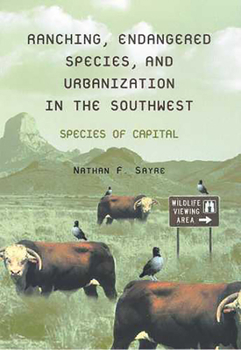Ranching, Endangered Species, and Urbanization in the Southwest: Species of Capital
Ranching is as much a part of the West as its wide-open spaces. The mystique of rugged individualism has sustained this activity well past the frontier era and has influenced how we view--and value--those open lands. Nathan Sayre now takes a close look at how the ranching ideal has come into play in the conversion of a large tract of Arizona rangeland from private ranch to National Wildlife Refuge. He tells how the Buenos Aires Ranch, a working operation for a hundred years, became not only a rallying point for multiple agendas in the "rangeland conflict" after its conversion to a wildlife refuge but also an expression of the larger shift from agricultural to urban economies in the Southwest since World War II. The U.S. Fish and Wildlife Service bought the Buenos Aires Ranch in 1985, removed all livestock, and attempted to restore the land to its "original" grassland in order to protect an endangered species, the masked bobwhite quail. Sayre examines the history of the ranch and the bobwhite together, exploring the interplay of social, economic, and ecological issues to show how ranchers and their cattle altered the land--for better or worse--during a century of ranching and how the masked bobwhite became a symbol for environmentalists who believe that the removal of cattle benefits rangelands and wildlife. Sayre evaluates both sides of the Buenos Aires controversy--from ranching's impact on the environment to environmentalism's sometimes misguided efforts at restoration--to address the complex and contradictory roles of ranching, endangered species conservation, and urbanization in the social and environmental transformation of the West. He focuses on three dimensions of the Buenos Aires story: the land and its inhabitants, both human and animal; the role of government agencies in shaping range and wildlife management; and the various species of capital--economic, symbolic, and bureaucratic--that have structured the activities of ranchers, environmentalists, and government officials. The creation of the Buenos Aires National Wildlife Refuge has been a symbolic victory for environmentalists, but it comes at the cost of implicitly legitimizing the ongoing fragmentation and suburbanization of Arizona's still-wild rangelands. Sayre reveals how the polarized politics of "the rangeland conflict" have bound the Fish and Wildlife Service to a narrow, ineffectual management strategy on the Buenos Aires, with greater attention paid to increasing tourism from birdwatchers than to the complex challenge of restoring the masked bobwhite and its habitat. His findings show that the urban boom of the late twentieth century echoed the cattle boom of a century before--capitalizing on land rather than grass, humans rather than cattle--in a book that will serve as a model for restoration efforts in any environment.
Format:Paperback
Language:English
ISBN:0816525528
ISBN13:9780816525522
Release Date:February 2006
Publisher:University of Arizona Press
Length:278 Pages
Weight:1.20 lbs.
Dimensions:0.8" x 6.7" x 9.1"
Customer Reviews
0 rating





